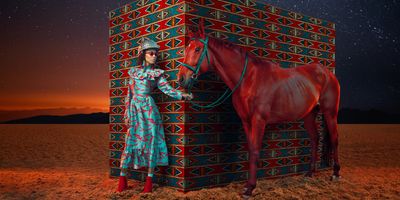In Conversation with Osborne Macharia: 'There is no excuse to creating sub-standard work just because it’s from ‘Africa’.'
The Kenyan photographer talks about his Afrofuturistic photoshoot for Africa's biggest horse racing and fashion event—the Durban July.
Osborne Macharia is a Kenyan visual artist and fine art photographer with an exquisite eye that is committed to capturing the unique and endless creative realities of the African continent. Back in 2016, Macharia created NYANYE, a stunningly refreshing editorial that photographed badass grannies "who were once corporate and government leaders in the 1970s but are now retired" and are now a part of Kenya's League of Extravagant Grannies, according to Macharia.
A few months later, he followed that body of work with a collective entitled Kabangu which captured eccentric hip-hop grandpas. Then last year, Marvel commissioned Macharia to create exclusive artwork for Black Panther wherein he introduced the world to the three "Blind Elders of Wakanda".
This year, Macharia is back with an Afrofuturistic photoshoot with Vodacom Red and South African designers Laduma Ngxokolo, Sindiso Khumalo and Rina Chunga Kutuma for this year's Durban July—South Africa (and Africa's) biggest annual horse racing and fashion extravaganza. The Durban July is currently underway and this year's theme is "Once Upon an African Future". The photoshoot seeks to create materials that personify Afrofuturism through combining historical elements, the present culture as well as the future aspirations of people of color whilst simultaneously creating universes that one wouldn't normally see.
We caught up with the visual artist to find out what Afrofuturism means to him as well as how he and his collaborators hope to shake the space up at this year's Durban July.
This interview has been edited for length and clarity.
Personally, why is Afrofuturism important in the the post-colonial era?
It's in a way saying 'We are taking back out story'. We get to write our story our own way. We cannot take away the fact that we are highly influenced by the fact that we have grown up in a post-colonial era that defines a lot of how we live, think, create and see ourselves. Through Afro-futurism we have the opportunity to re-imagine a different future that's not dictated by 'they say' but by 'we say'. It opens up a huge world of creativity and positivity that anyone can be a part of.
As a photographer, what has propelled you into this particular space?
My wife keeps telling me, "Osborne, you easily get tired of the same old," and I think this is part of the reason that got me into creating such body of work long before I even realized such a term as 'Afrofuturism' existed. I'm always questioning 'what if' when it comes to matters of creativity.
How do you think your work (in its entirety) is helping re-imagine Africa and especially its creative space?
My team and I are always looking for something different, that makes people have a different and more appreciative approach to people you would not ordinarily pay attention to while also integrating culture and familiar an environment into it. We have a deep culture that's often side-lined when negative news pops up regarding our state of affairs as a continent. We want to change that. Now, more than ever, people need something positive to hold onto, something they can connect to and to see people who look like themselves in places where they can prosper.
How are you and your fellow collaborators hoping to disrupt the space at the Durban July?
I think with the initial launch of the project on social media, the response we got was overwhelmingly good and created a buzz regarding Durban July. We hope that during the actual event, that the images and collections the designers have in store for everyone, are going to inspire a greater sense of creativity and imagination. Even if only one person leaves the place having been inspired, then my work is done.
What would you say to aspiring Afrofuturists in the photography space about innovating and the need for constant reinvention?
Never be afraid to day dream and let your mind wonder. Your mind needs to keep thinking of the next idea, the next choice of medium, the next experience…that's how you remain relevant. One other thing is to create work that is up to international standards in terms of the technical execution. There is no excuse in creating sub-standard work just because it's from 'Africa'.
